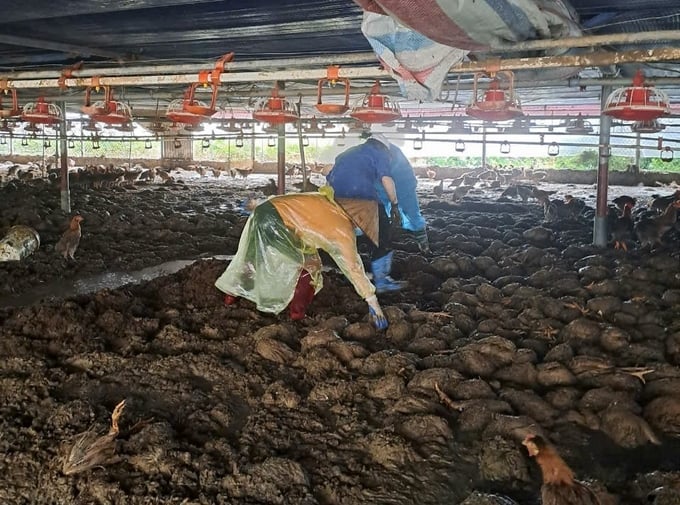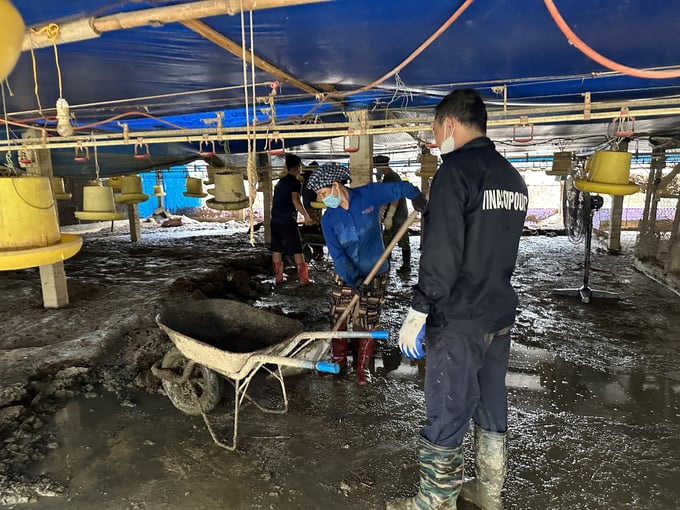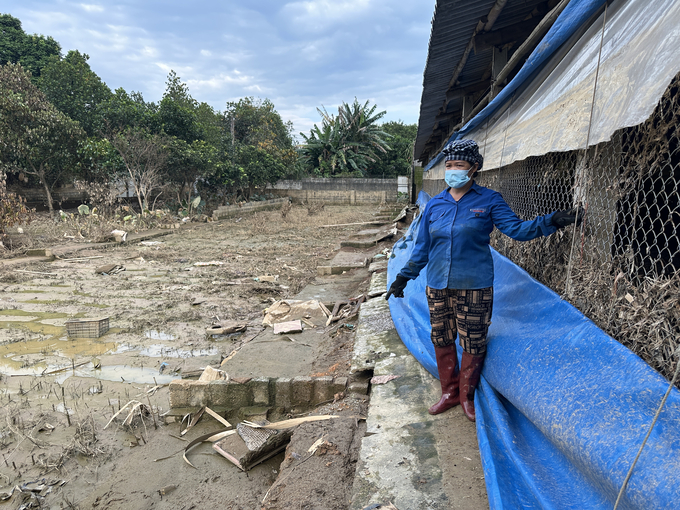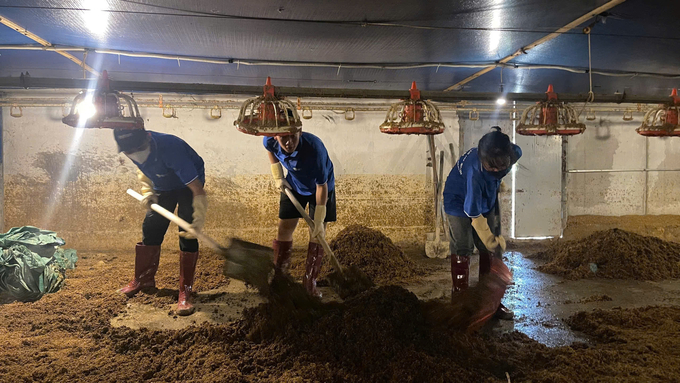May 24, 2025 | 16:26 GMT +7
May 24, 2025 | 16:26 GMT +7
Hotline: 0913.378.918
May 24, 2025 | 16:26 GMT +7
Hotline: 0913.378.918

Local people and veterinary staff help Duong Van Sang clean up animal carcasses at his chicken farm. Photo: Quang Linh.
Duong Van Sang's chicken farm in Dong Xe hamlet, Son Cam commune (Thai Nguyen city, Thai Nguyen province) suffered a loss of 20,000 chickens by floodwaters, with an estimated value of up to VND 3 billion. After just one day of flooding, Sang’s chicken farm was left with only animal carcasses mixed with mud and feces, resulting in a strong stench. Sang had just imported 1,000 bags of bran to prepare for the year-end crop, but the flood water had ruined them all, and now he had no choice but to throw them away.
Flood water slowly submerged Duong Van Sang's farm. Footage: Quang Linh.
Sang opened the last video of the chicken farm for the reporter to see. In the video, Sang choked up. "This is the last image of my flock of chickens, 50 days old, 5,000 chickens. You can’t imagine how much time I spent caring for and raising them. The rain comes, the flood is here, I put up a tree stair to let the chickens stand but they can't get there in time. It is 2 am now, the flood water is just above the chicken coop. I've never had such a beautiful flock of chickens. There's nothing more painful."
Duong Van Sang grived in the final moments before floodwaters submerged the entire farm. Footage: Quang Linh.
As a large livestock commune in Thai Nguyen city, Cao Ngan commune suffered losses of more than 176,000 poultry of all kinds in the recent historic flood, worth up to VND 18.6 billion. As for animal feed, agricultural materials, barns, the damage is estimated at VND 2.7 billion.
The flood water at Nguyen Van Nghi's chicken farm (Vai hamlet, Cao Ngan commune) has receded for many days now, but there is still a lot of mud and dirt, along with quite a strong stench. Nghi's farm has 7,000 chickens raised in a semi-industrial manner, all of which are 80 days old, only 10 days left before they can be sold to the market. The flood came rolling in, the water rose more than 1.5 m, Nghi's whole family had to abandon everything and run for their lives.

Nguyen Van Nghi's chicken farm clears the mud after the flood. Photo: Quang Linh.
Not only did the livestock die, but the farming equipment was also damaged, all the savings of a lifetime were in vain. “The damage was nearly VND 1 billion, in the countryside that amount of money is massive. The flood water rose so fast. At first, we planned to move the chickens to a higher place but it was too late, some households in the village moved them all the way to the roof, but the flood still swept them all away,” Nghi said.
Doan Viet Dung, Chairman of Cao Ngan commune said, “We are making proposals to the competent authorities and hope that relevant units and businesses can support farmers with seeds and agricultural materials. Banks should have policies to postpone and extend debt repayments so that farmers can restore production considering the current difficult context”.
When floods come, the damage is not only property and human lives, but also the environment and the potential risk of disease. Cao Ngan commune has recently distributed 20 tons of lime powder to disinfect and sterilize the barn systems. Local authorities also coordinated with the military to support people in collecting and burying animal carcasses according to veterinary instructions.

Floods destroyed the wall of Nguyen Van Nghi's chicken farm. Photo: Quang Linh.
According to Dao Thi Kim Quy, Director of the Agricultural Service Center of Thai Nguyen city, after the flood recedes, the risk of animal disease outbreaks is very high, and people need to pay special attention. “Farms must give top priority to cleaning up and burying dead animals. Sprinkle lime, disinfect the barn area, and clean up mud. Do not rush to restock when the farming environment is not safe,” said Director Quy.
Through monitoring the storm and flood situation in the city, it can be seen that many livestock farms are severely affected by floods. Tens of thousands of livestock and poultry are submerged in water and swept away into rivers and streams. After the water recedes, the carcasses of livestock, poultry, mud and soil would directly affect the health of humans and the environment.
Thai Nguyen University of Agriculture and Forestry has mobilized a large human resource to help local farmers clean up after the flood through the university’s Youth Union and One Health Club. The workforce includes 5 lecturers and 250 students, deployed in some communes of Thai Nguyen province (Dong Hy district, Phu Binh district, Pho Yen city, Thai Nguyen city) and Cam Pha city of Quang Ninh province.

Students from Thai Nguyen University of Agriculture and Forestry help people clean up their farms. Photo: Quang Linh.
Students showed support by participating in the work of handling animal carcasses, collecting, digging holes, burying, spreading lime, and disinfecting in areas far from residential areas to ensure hygiene and safety with the consultation of relevant local authorities.
The support team participated in cleaning and disinfecting water sources for daily life and livestock use as they were polluted by storms and floods. Necessary supplies were also provided to traditional markets in flooded areas to ensure food hygiene and safety.
Dr. Phan Thi Hong Phuc, Vice Principal of Thai Nguyen University of Agriculture and Forestry, recommends that farmers take six steps to treat the livestock environment after the flood.
Step 1: Collect and process poultry carcasses according to the instructions of the veterinary staff.
Step 2: Clean and sanitize barns, livestock equipment, pipeline systems, water tanks and water containers.
Step 3: Disinfect and disinfect barns and livestock areas twice a week with disinfectants. Combine with sprinkling lime powder or spraying disinfectants on all walkways, corridors, sewers, roads and vehicles.
Step 4: Repair and reinforce livestock barns, water systems, and wastewater treatment systems.
Step 5: Dredge and clear sewers, drainage ditches, clear bushes, and manure ponds.
Step 6: Sprinkle lime powder or spray disinfectants on all walkways, corridors, sewers, roads and vehicles.
Translated by Samuel Pham

(VAN) In the tranquil wetlands of Van Long, there are quiet souls who guard the forests, nurture the waters, and oversee every bird and troop of langurs as protecting the essence of a living heritage.

(VAN) WWF, GIZ, IUCN, UNDP call for biodiversity conservation and sustainable development must be regarded as a unity in strategies for a green future.

(VAN) On celebration of International Day for Biological Diversity, Deputy Minister Nguyen Quoc Tri called for practical actions to address nature and biodiversity conservation.

(VAN) Dr. Hoang Thi Thanh Nhan – Deputy Director of the Nature and Biodiversity Conservation Agency – highlighted this on the International Day for Biological Diversity, May 22, 2025.
![Ho Chi Minh city adapts to climate change: [2] Accelerating action](https://t.ex-cdn.com/nongnghiepmoitruong.vn/608w/files/chiqk/2025/05/22/4024-4220-bien-doi-khi-hau-1-100626_766.jpg)
(VAN) Clearly recognizing the challenges posed by climate change, Ho Chi Minh city has swiftly shaped its policies and implemented practical solutions to adapt.

(VAN) Rice straw is no longer just a discarded byproduct, but it is becoming a green resource that helps farmers in the Mekong Delta reduce emissions and promote circular, sustainable agriculture.

(VAN) Other Effective Area-based Conservation Measures (OECMs) are solutions that contribute effectively to achieving the goals of the Kunming–Montreal Global Biodiversity Framework.